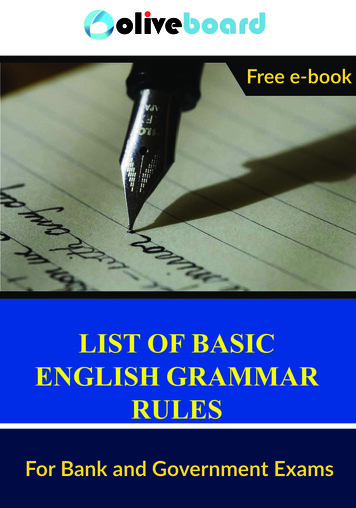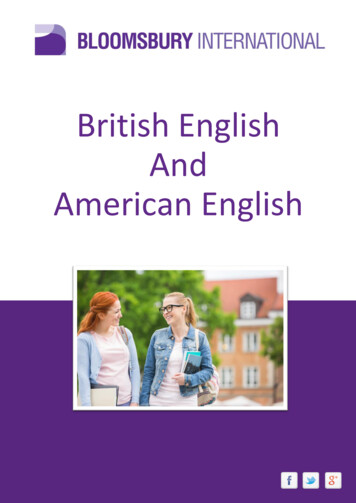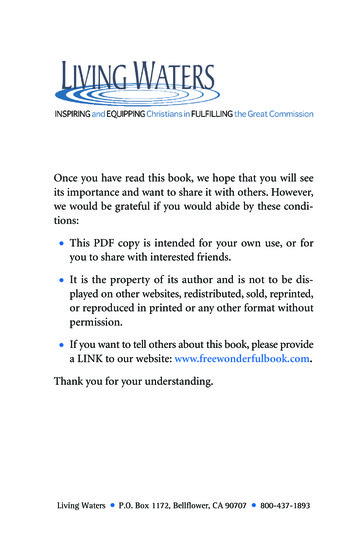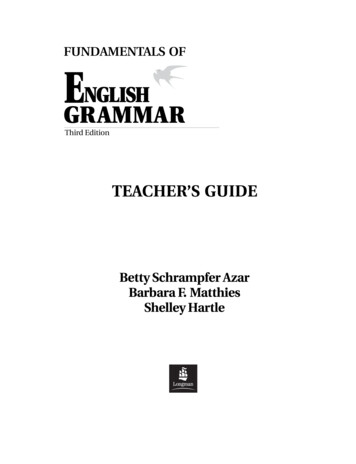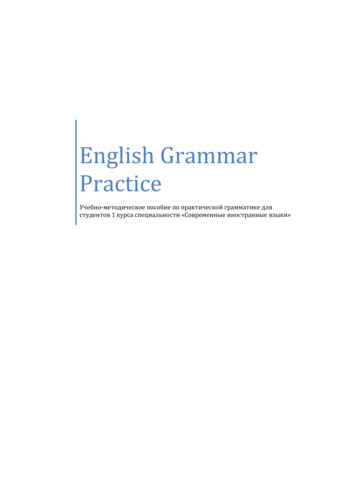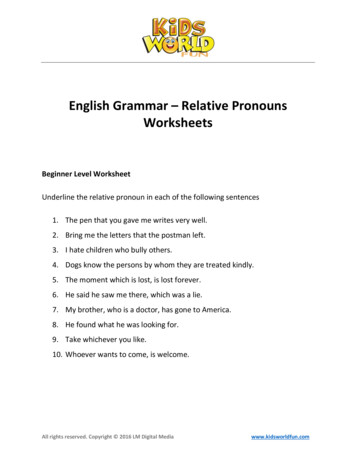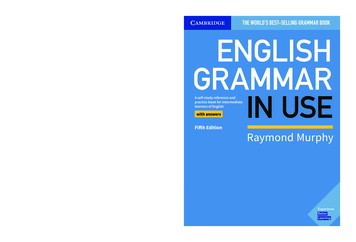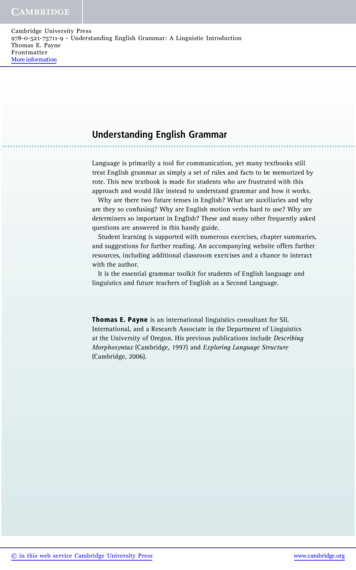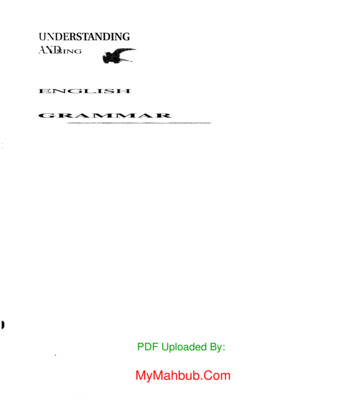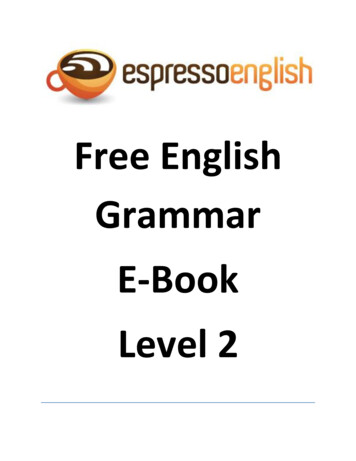
Transcription
Free EnglishGrammarE-BookLevel 2
2 Table of ContentsPresent Continuous For Future Use 5Will or Going To? .6Linking Words: Reasons and Results 7Linking Words: Adding, Organizing, Summarizing 10Linking Words: Contrasting Ideas 13Tips for Learning Irregular Verbs 14Simple Past and Past Continuous 20Present Perfect Ever / Never 23Present Perfect Yet / Already / Just 25Present Perfect For / Since 27Present Perfect Simple / Continuous 28Comparative Adjectives: Not as as 30Comparative Adjectives: Quantifiers 31Comparative or Superlative? 33So / Neither / Too 34Verbs Infinitive or –ING 38Permission, Obligation, Prohibition 42Prepositions of Time 46Prepositions of Place 51Prepositions of Movement 56Relative Clauses 61Word Order: Asking Questions 65www.espressoenglish.net
3 Direct and Indirect Questions 70Two Forms of “Used to” 73Too and Enough 74Some / Any / No 75Subject-Verb Agreement 78First Conditional 81Second Conditional 83Should / Could / Would 85Past Perfect 88Present Perfect or Past Perfect? 91Passive Voice: Present / Past 94Reported Speech: Statements 95Reported Speech: Requests, Orders, Questions 97www.espressoenglish.net
4 Welcome!Thanks for downloading the Free English Grammar E-Book Level 2 – I hopeit helps you with your English studies! If you have any questions about thelessons, please e-mail me at help@espressoenglish.netEspresso English has over 300 fun, fast online English lessons(www.espressoenglish.net). You can also sign up to get new English lessonsevery week by e-mail, as well as the Free English Grammar E-Book Level 1.Please Share This BookThis book is free, but can I ask you to help me with one thing?Please post a link to the book on Facebook and Twitter to share it with yourfriends and classmates. Thanks – I really appreciate it!www.espressoenglish.net
5 Present Continuous For Future UseTalking about the future in EnglishMany students use only will or going to inorder to talk about the future. However, it’svery common to use the presentcontinuous to talk about the future, in the caseof arrangements that are planned: I’m having dinner with friends tonight. She’s meeting David at the train station tomorrow.-He isn’t coming to the party.-We aren’t seeing our family this weekend.?What are you doing on Saturday?Is Mary arriving at 7:00 or 8:00 tomorrow morning?You can use the present continuous for future plans with these words:tonight, tomorrow, this weekendnext week/month/yearthis summer/fall/winter/springon Monday/Tuesday/Wednesday/etc.next et
6 Will or Going To?There are two additional ways to talk about the future in English:will/won’t and going to.Use “going to” for plans and arrangements:On my next vacation, I’m going to stay in a nice hotel in Paris.She’s going to look for a new job after her current contract ends.David’s going to meet me at the airport at 8:00.We’re going to get married next July.They’re going to visit Amy next week. They made plans to meet upon Monday.Peter and Paul are going to share an apartment when they move toNew York.Note: You can also use the present continuous for the future in these cases.On my next vacation, I’m staying at a nice hotel in Paris.David’s meeting me at the airport at 8:00.We’re getting married next July.Use “will/won’t” for promises:I‘ll send you an e-mail.I won’t tell anyone your secret.He‘ll pay you back tomorrow.We won’t forget your birthday.Use “will” for offers:I‘ll buy you a drink.My secretary will help you with the paperwork.Use “will” for decisions made in that moment:“Would you like potatoes or rice?”“I‘ll have the rice.””Which shirt do you like?”“Well, the red one is cheaper, but I prefer the color blue. I‘ll take theblue one.”www.espressoenglish.net
7 You can use either “will/won’t” or “going to” for predictions or generalstatements about the future:My company‘s going to move its headquarters overseas next year.My company will move its headquarters overseas next year.Your wife will love those flowers – they’re beautiful!Your wife’s going to love those flowers – they’re beautiful!The economy isn’t going to improve much this year.The economy won’t improve much this year.He won’t pass the test. He hasn’t studied at all.He’s not going to pass the test. He hasn’t studied at all.Use I think will and I don’t think will to express thoughtsabout the future.Don’t use I think won’t. (it doesn’t sound natural). I think you won’t like this movie. It’s very violent. I don’t think you’ll like this movie. It’s very violent.Will/Won’t vs. Going to QuizClick here to take the -willwont-vs-going-to#quizLinking Words: Reasons and ResultsImage source: FreeDigitalPhotos.netLinking words help you connect the ideas in asentence. In this lesson, you’ll learn somecommon linking words toexpress reasons and results.Linking Words: Reasonswww.espressoenglish.net
8 Because / Because ofThe difference between these two words is that because is followed bya subject verb, and because of is followed by a noun: The game was canceled because of the rain. The game was canceled because it was raining.In spoken English, many people say ’cause as a short form of “because.”Due to / Owing toDue to and owing to are also followed by a noun. These words are a littlemore formal.There’s a lot of traffic today due to the upcoming holiday.(holiday noun)The after-school program was canceled owing to lack of interest fromthe students.(lack noun)Due to the fact that / Owing to the fact thatUse these phrases before a subject verb. Again, these phrases are a littlemore formal.Many people are still unemployed due to the fact that the economicrecovery has been slower than anticipated.The publisher rejected the author’s latest work owing to the fact thatthe manuscript was full of errors.Since / AsSince and as are more informal, and they are followed by a subject verb. I’m going to bed at 10 PM since I need to get up early tomorrow. I didn’t go to the gym today, as I had a lot of homework to do.Linking Words: Resultswww.espressoenglish.net
9 Therefore / Consequently / As a resultThese words are more formal, and are more commonly used in writtenEnglish.Our company’s profits have increased 150% in the pastyear. Therefore, we’re going to invest in new equipment and trainingprograms.The tennis player had knee surgery mid-October; consequently, shetook the rest of the season off.There have been heavy rains throughout the interior of the state. As aresult, several areas have experienced flooding.So“So” is more informal, and more commonly used in spoken English.We were hungry, so we stopped at a cafe for a snack.Linking Words Quiz: Reasons and ResultsClick here to take the lish.net
10 Linking Words:Adding, Organizing, SummarizingAdding Information and Examplesfor example / for instanceUse these words to give one example of the idea you are talking about. Bothof these expressions can go at the beginning or the end of a sentence.There are a number of problems in this school. For example, many ofthe classrooms don’t have audiovisual equipment.She has a lot of good ideas for our business – opening an onlinestore, for instance.Written English: i.e. and e.gIn written English, we can use i.e. to give further explanation orclarification; it means “that is” or “in other words.”Our last marketing campaign failed (i.e. we spent 50,000and didn’t make many sales).We can use e.g. to give examples; it means “for example”I enjoy radical sports (e.g. rock climbing, hang gliding, andwindsurfing).In formal writing, these expressions always appear insideparentheses.namely / such asThere is a difference between namely and such as.Namely is followed by ALL of the examples you referred to, but suchas gives only one or some of the examples, not all of them.www.espressoenglish.net
11 A few of the students – namely Brian, Thomas, and Jack – failed the course.A few of the students, such as Brian, failed the course.also / tooAlso can go in the middle of a sentence, whereas too is typically used at theend.We did a lot of sightseeing on our vacation. We also bought a number ofsouvenirs.We did a lot of sightseeing on our vacation. We bought a number ofsouvenirs, too.as well / as well asAs well goes at the end of the sentence (similarly to too).As well as must be followed by another word. She’s not only extremely successful, she’s beautiful as well. She’s beautiful as well as being extremely successful.in addition / moreover / furthermoreThese linking words are usually used at the beginning of a sentence to addanother idea or further develop the previous point.People who exercise regularly have more energy during the day andsleep better at night. In addition, they tend to live longer.Construction on the new subway has been delayed for months due tobudget shortfalls. Moreover, the workers are threatening to go onstrike.Our sales are expected to rise 30% in the nextyear. Furthermore, purchase of new equipment will help cutmanufacturing costs and increase profits.www.espressoenglish.net
12 Note: In addition, moreover, and furthermore are more formalEnglish. In informal spoken English, we usually use the expressionsplus, what’s more, and besides.Organizing and Ordering InformationFirstly / SecondlyWhen you are going to make a series of points, you canuse firstly and secondly for the first and second points. After that, you canuse “The third point,” ”The fourth point,” etc. or “in addition.”Lastly / FinallyFor your final point, you can begin the sentence with lastly or finally. Thesewords show your audience that you are almost finished.the former / the latterYou can use these words to refer back to two examples previouslymentioned:Our company has two factories: one in Detroit and one in Atlanta. Theformer is operating at 95% capacity and the latter at 65%.In this case, “the former” the factory in Detroit, and “the latter” thefactory in Atlanta.Summarizing InformationHere are some English phrases you can use to give a summary of theinformation you have already said or written. In general, these phrases go atthe beginning of the sentence and are followed by a comma. In short, In summary, To summarize, In conclusion, In a nutshell,(more informal)www.espressoenglish.net
13 Linking Words: Contrasting IdeasImage source: FreeDigitalPhotos.netBut / HoweverBut is more informal than however. You canuse however at the beginning of a sentence, but you can’tuse but at the beginning of a sentence (in written English).I tried to lift the box, but it was too heavy for me.I tried to lift the box. However, it was too heavy for me.Although / Even thoughThese linking words are the same, and they are both followed by a subject verb.Although I exercise every day, I can’t seem to lose any weight.She still loves him, even though he treated her very badly.Despite / In spite ofThese linking words are the same, and they are followed by a noun ora gerund (-ing form of the verb, which can function as a noun).Our plane arrived on time in spite of the delay during takeoff.We won the game despite having two fewer players.Despite the fact that / in spite of the fact thatThese phrases are followed by a subject verb.They arrived on time in spite of the fact that they left an hour late.We won the game despite the fact that we had two fewer players.While / Whereas / UnlikeThese linking words are used to make contrasts. While and whereas areusually used between two complete phrases. Unlike is typically used withonly a subject.I like tennis, while my brother prefers bowling.www.espressoenglish.net
14 This cell phone plan costs 0.05 per minute, whereas that one givesyou up to 800 minutes per month for a fixed price.His boss allows him to work from home, unlike mine.She’s very friendly, unlike her sister.Linking Words Quiz: Contrasting IdeasClick here to take the contrastingideas#quizTips for Learning Irregular VerbsDid you know that about 70% of the time when we use a verb in English, itis an irregular one? That means that learning and using irregular verbs isessential for learning English!The English language has so many irregular verbs that it can make you gocrazy but even irregular verbs follow some patterns. In this lesson,you’ll learn “groups” of irregular verbs that can make it easier to memorizethem.Don’t just study this list – try to create your own sentences and use all theverbs you know! This will help you remember them much better.Ready? Let’s go!Verbs with all 3 forms identicalLet’s begin with the easiest group of irregular verbs. These verbs are thesame in the present, the past, and the past participle. They include:bet, burst, cast, cost, cut, fit,* hit, hurt, let, put, quit, set, shut, split,spread* When talking about clothes being the correct sizeVerbs with identical Present and Past Participlewww.espressoenglish.net
15 These verbs are the same in the present and the past participle. Only thesimple past form is different:PresentPastPast erbs with –N in the Past ParticipleThese verbs are a little more complicated, as they have –n in the pastparticiple
4 www.espressoenglish.net Welcome! Thanks for downloading the Free English Grammar E-Book Level 2 – I hope it helps you with your English studies!File Size: 1MBPage Count: 99
